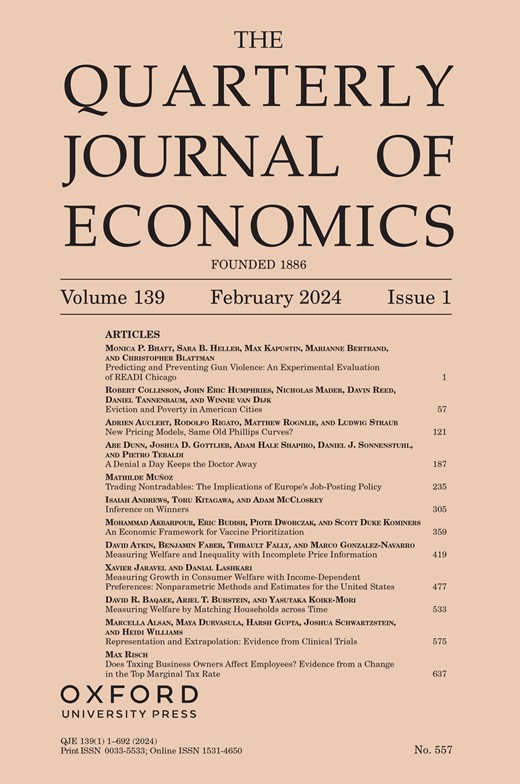Monitoring for Waste: Evidence from Medicare Audits
IF 12.7
1区 经济学
Q1 ECONOMICS
引用次数: 0
Abstract
Abstract This paper examines the tradeoffs of monitoring for wasteful public spending. By penalizing unnecessary spending, monitoring improves the quality of public expenditure and incentivizes firms to invest in compliance technology. I study a large Medicare program that monitored for unnecessary health care spending and consider its effect on government savings, provider behavior, and patient health. Every dollar Medicare spent on monitoring generated ${\$}$24–29 in government savings. The majority of savings stem from the deterrence of future care, rather than reclaimed payments from prior care. I do not find evidence that the health of the marginal patient is harmed, indicating that monitoring primarily deters low-value care. Monitoring does increase provider administrative costs, but these costs are mostly incurred up-front and include investments in technology to assess the medical necessity of care.监测浪费:来自医疗保险审计的证据
摘要本文考察了监控浪费公共支出的权衡。通过惩罚不必要的支出,监督提高了公共支出的质量,并激励企业投资于合规技术。我研究了一个大型的医疗保险计划,该计划监测了不必要的医疗保健支出,并考虑了它对政府储蓄、提供者行为和患者健康的影响。医疗保险在监控上每花费1美元,就会为政府节省24-29美元。大部分的节省来自对未来护理的威慑,而不是从先前护理中收回的款项。我没有发现证据表明边缘病人的健康受到损害,这表明监测主要是阻止低价值的护理。监测确实增加了提供者的管理成本,但这些成本大多是预先产生的,包括对评估护理的医疗必要性的技术投资。
本文章由计算机程序翻译,如有差异,请以英文原文为准。
求助全文
约1分钟内获得全文
求助全文
来源期刊

Quarterly Journal of Economics
ECONOMICS-
CiteScore
24.20
自引率
2.20%
发文量
42
期刊介绍:
The Quarterly Journal of Economics stands as the oldest professional journal of economics in the English language. Published under the editorial guidance of Harvard University's Department of Economics, it comprehensively covers all aspects of the field. Esteemed by professional and academic economists as well as students worldwide, QJE holds unparalleled value in the economic discourse.
 求助内容:
求助内容: 应助结果提醒方式:
应助结果提醒方式:


